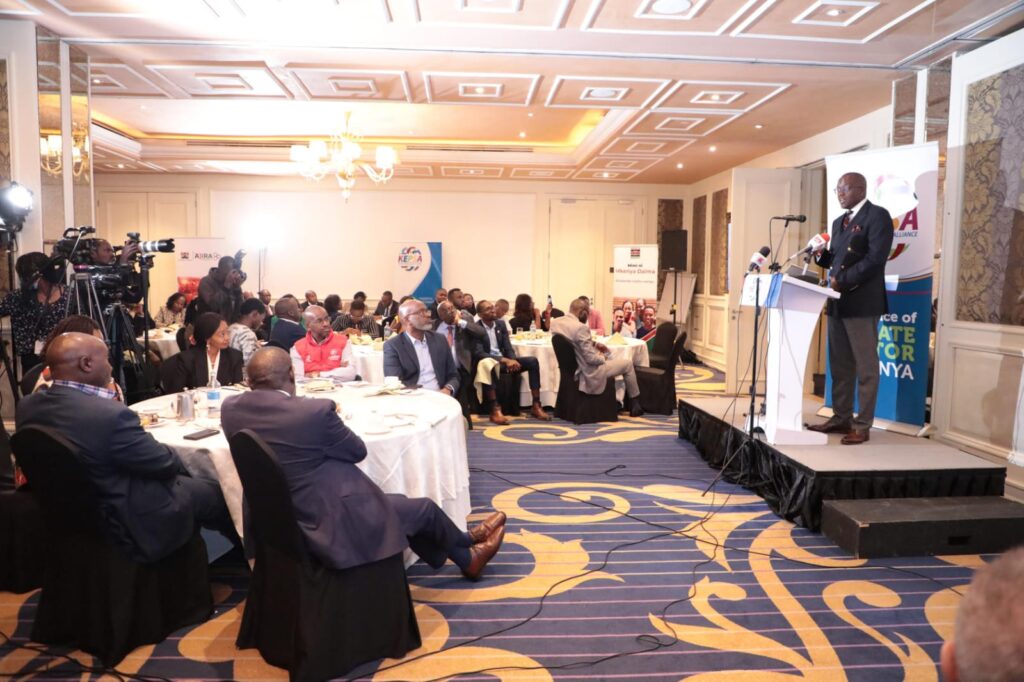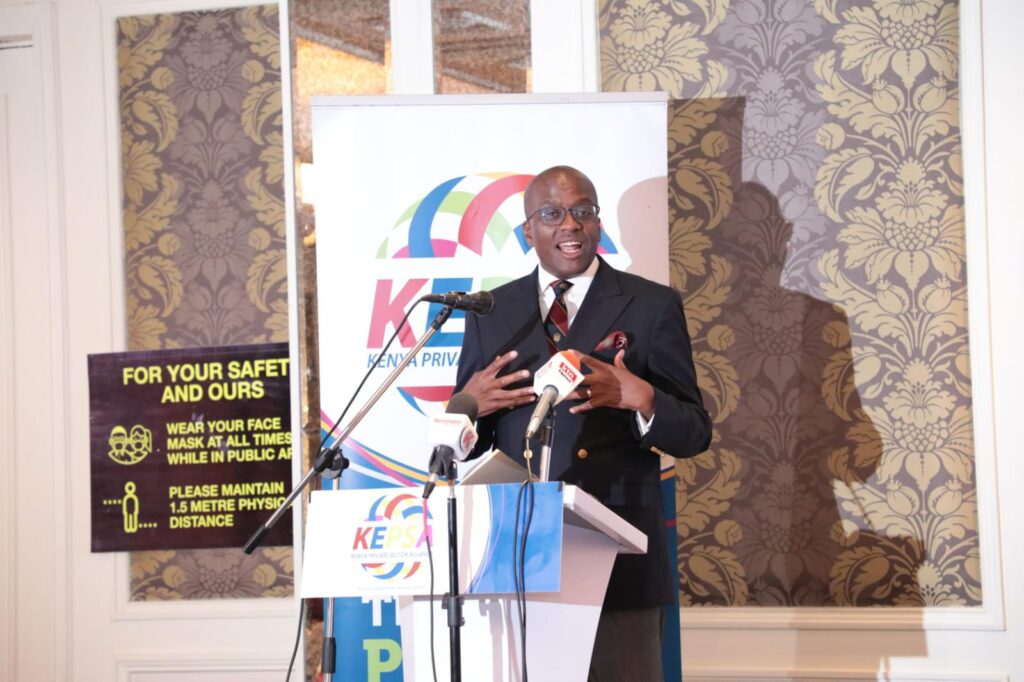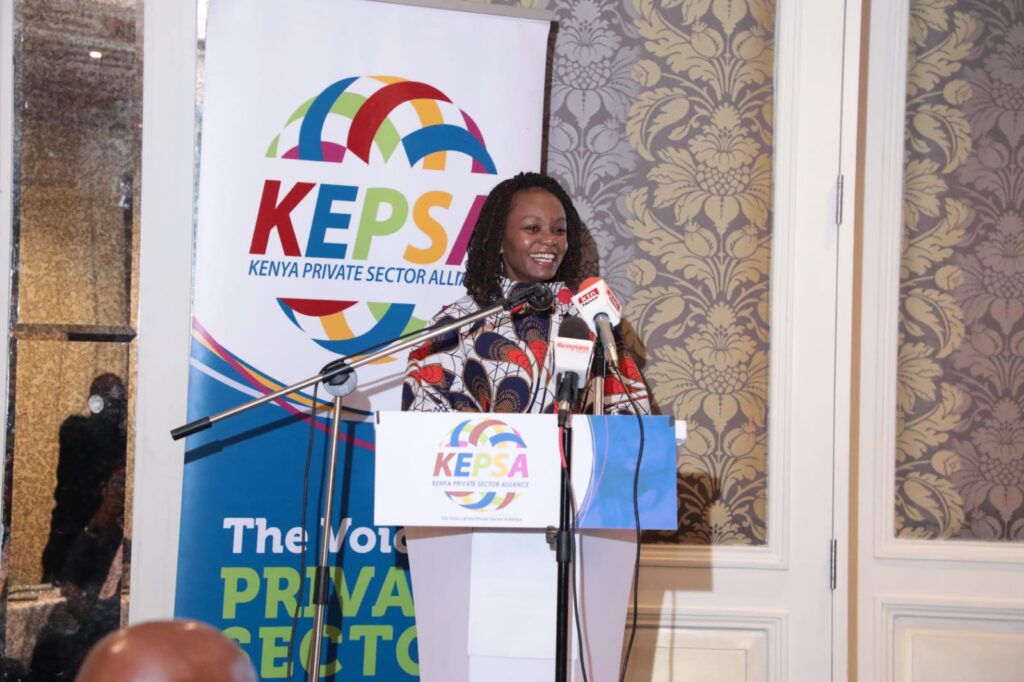Igathe Meets KEPSA To Popularise Nairobi Gubernatorial Bid

The Kenya Private Sector Alliance (KEPSA) today presented the Private Sector Economic Manifesto for Nairobi County to the Azimio La Umoja-One Kenya Alliance candidate for Governor, Mr. Polycarp Igathe.
The manifesto emphasizes eight thematic areas where the private sector wants changed, on how the capital city is governed including e-government, compliance and enforcement, healthcare, competitiveness, jobs creation as well as culture, and social inclusion.
Other priority interventions include a working and sustainable urban mobility and transport system, an integrated urban land use plan, water, wastewater and solid waste management, and robust security & disaster risk management agenda for the city.
In presenting the manifesto, KEPSA hopes to influence both the presidential and Gubernatorial candidates to incorporate the private-sector economic agenda into their leadership manifesto. According to Carole Kariuki, KEPSA Chief Executive Officer (CEO), Nairobi requires a leader who will prioritize making Nairobi a competitive, green, inclusive, resilient, and safe city to live, work and do business.

“KEPSA has been key in advancing legislative advocacy work around improving the business environment and our development model through Public-Private Partnerships, and this will be key in driving the economy of the county. It is time to make our city workable and tourist-friendly to transform it to greater heights”, said Kariuki.
In KEPSA’s wish list for the county, is the call to embrace technology for a world-class mobility and transport system coupled with proper management of traffic and congestion in the city with full implementation of the national address system.
Others are the strengthening and availability of public health services including capacity building and recruitment of adequate staff as well as the development of an integrated system to manage water supply by increasing sufficiency, harvesting, and recycling as well as adopting smart waste management systems for Nairobi.
“The next county government must ensure the complete restoration of Nairobi River and its tributaries. It is time to start having outdoor concerts by the rivers and parks around the city”, added Kariuki.
Similarly, the private sector wants the establishment and operationalization of a County Disaster Operation Center, fully equipped with Early Warning Systems, hazard mapping, a disaster monitoring database, and Standard Operating Procedures detailing the full continuum of procedures for handling Level 1 and Level 2 disasters.

Speaking at the event, Igathe said if elected he will seek to create a fit-for-purpose county government in the first one hundred days, with motivated staff and cabinet, to deliver on his vision of Nairobi, adding that he will institute a five-year score card pegged on a yearly performance agreement with the public.
“The work of a leader is to find solutions and not amplify problems. Give me a performance agreement to work with to deliver the scorecard that will be based on my manifesto for Nairobi”, said Igathe.
Saying that an average of 50,000 households go to bed hungry each day, Igathe committed to delivering zero hunger, decent jobs, and well-being for Nairobi residents as the priority of his performance agreement focusing on three areas, the Society, the Economy, and the Environment (SEE).
Igathe said his government will institute a ‘Linda Jamii’ social protection program geared towards improving and uplifting the sprawling informal settlements in Nairobi. This among other initiatives would be delivered via a Nairobi County Foundation that will aggregate ideas, resources, and development agenda with the private sector and other stakeholders.
In streamlining the economy of the city, Igathe said his priority would be to plug the revenue leakage in the county and harness resources towards investing in the transformation of Nairobi that he will seek to re-brand by taking advantage of the underutilized historical and other cultural assets of the city.

“The problem with Nairobi is not the absence of the law but implementation. To attract private sector investment and public participation in bringing the change we want to Nairobi we will catalyze business through incentives starting with the rationalization of county licenses as well as get rid of the many cartels that control the various aspects of running the city”, he said.
KEPSA, being the voice of the private sector and convener of the Mkenya Daima Initiative is seeking to work with all aspiring leaders to influence their leadership manifestos for a people-centered and economy-led transformation of the country.
‘Peace is at the heart of successful elections. The Leadership and Governance pillar is at the heart of Chapter Six of the Constitution of Kenya, 2010. Electing transformative leaders who embrace, and exhibit values is a key component of leadership’, said Eng. Patrick Obath, the KEPSA Foundation Chairman, and member of the Mkenya Daima
Initiative.
Mkenya Daima is a non-partisan multi-stakeholder platform formed in 2012 with the primary purpose of inspiring peaceful elections and a smooth leadership transition, thus creating stability, which is essential for business continuity and prosperity for Kenya as a nation. Previous initiatives under Mkenya Daima saw the country experience peaceful elections in 2013 and 2017.
The Private Sector Economic Manifesto has been developed by KEPSA through a stakeholder engagement process cutting across all sectors of the economy. It draws out key priorities for national development and business sectoral priorities, which can only be achieved through partnership and collaboration with the government and other stakeholders.
KEPSA’s vision is to be a world-class private sector apex body with a primary mission to ensure year-on-year improvement in the overall business environment for Kenya by working together with the government and other stakeholders and being involved in the socio-economic development of the country.





